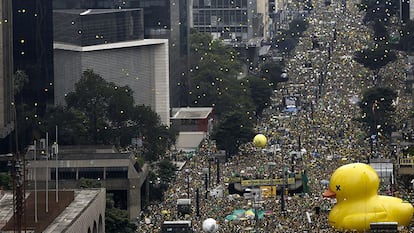Record protests in Brazil pile pressure on President Rousseff
Three million march against corruption and to call for leader’s impeachment

Large crowds dressed in green and yellow marched in more than 200 Brazilian cities on Sunday to call for the impeachment of President Dilma Rousseff and ask authorities to arrest former president Luiz Inácio Lula da Silva. The demonstrations have become the largest political protests seen in the country’s democratic history, a fact that puts even more pressure on the Rousseff administration. The president and various cabinet members have been embroiled in a long-running corruption scandal involving state oil company Petrobras.
According to O Globo newspaper, about three million people participated in the demonstrations on Sunday. Folha d. S. Paulo newspaper says 500,000 attended the marches in São Paulo, while military police put the number there at 1.4 million. In Rio de Janeiro, organizers say there were 1.5 million demonstrators, while military police estimated that 100,000 people marched in Brasilia.
“I don’t want to live in another country, I want to live in another Brazil,” the crowd sang in Copacabana
“We have reached the limit,” says 71-year-old Rio resident and retired businessman Ricardo Castro. “It’s the first time I have attended a march. I have left all my grandchildren at home but I wanted to show my support for the Attorney General’s Office, for it to continue doing its job.”
Rio protestors recited the Lord’s Prayer and sang in support of the federal police and judge Sérgio Moro, the magistrate investigating the Petrobras scandal that has implicated several businessmen and politicians including former President Lula da Silva. “I don’t want to live in another country, I want to live in another Brazil,” the crowd sang in Copacabana.
On Sunday, São Paulo’s business district was brought to a standstill as demonstrators marched along Paulista Avenue carrying above their heads an enormous green-and-yellow sign calling for “Impeachment now!” They also waved inflatable dolls of Rousseff and Lula dressed as convicts. In the upper-middle-class Pinheiros neighborhoods, thousands wearing t-shirts with the Brazilian flag joined the march singing “Nossa bandeira jamais será vermelha” or “Our flag will never be red,” in reference to the ruling Workers’ Party (PT) banner.
Meanwhile, Rousseff and Lula supporters responded by holding discreet gatherings in various cities. In Rio, three youths with red t-shirts – presumably Workers’ Party supporters – were escorted away in a police vehicle to prevent an outbreak of violence.
São Paulo demonstrators marched carrying above their heads an enormous green-and-yellow sign calling for “Impeachment now!”
In 2013, Brazilians held marches across the country in response to a rise in commuter fares and to demand quality public education and healthcare. While that movement brought together citizens from all political ideologies, the current protests are absolutely anti-PT.
Sunday’s marches were an acid test for several organizations that have been working to combat corruption and oust Rousseff since 2014. The president’s popularity ratings have fallen to around 11% and the economy is struggling. A Chamber of Deputies petition is seeking to impeach her for alleged misappropriation of funds. At the same time, the Superior Electoral Court is examining the possibility of contesting the election of Rousseff and Vice President Michel Temer, of the Brazilian Democratic Movement Party (PMDB), over alleged irregularities during the 2014 campaign. If the court finds evidence of any illegal activity, it may call for new elections.
And Rousseff could lose even more support. At its national convention on Saturday, the PMDB asked its members not to accept any new posts from the Rousseff administration while the party takes 30 days to make a decision about its alliance with the PT. PMDB members head up six of the country’s 31 ministries and hold 67 out of 513 seats in the Chamber of Deputies.
Meanwhile, the São Paulo Attorney General’s Office has accused Lula of money laundering and called for him to be held in custody. Reports of corruption have fanned the flames of discontent and protest for months and the image of Lula in a police vehicle before he made his official statement regarding gifts he allegedly received from corrupt businesses was like pouring gasoline on the fire.
English version by Dyane Jean François.
Tu suscripción se está usando en otro dispositivo
¿Quieres añadir otro usuario a tu suscripción?
Si continúas leyendo en este dispositivo, no se podrá leer en el otro.
FlechaTu suscripción se está usando en otro dispositivo y solo puedes acceder a EL PAÍS desde un dispositivo a la vez.
Si quieres compartir tu cuenta, cambia tu suscripción a la modalidad Premium, así podrás añadir otro usuario. Cada uno accederá con su propia cuenta de email, lo que os permitirá personalizar vuestra experiencia en EL PAÍS.
¿Tienes una suscripción de empresa? Accede aquí para contratar más cuentas.
En el caso de no saber quién está usando tu cuenta, te recomendamos cambiar tu contraseña aquí.
Si decides continuar compartiendo tu cuenta, este mensaje se mostrará en tu dispositivo y en el de la otra persona que está usando tu cuenta de forma indefinida, afectando a tu experiencia de lectura. Puedes consultar aquí los términos y condiciones de la suscripción digital.








































